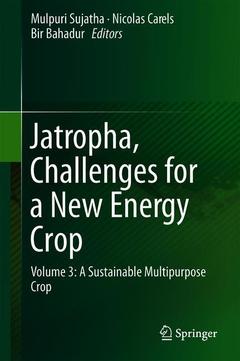Jatropha, Challenges for a New Energy Crop, 1st ed. 2019 Volume 3: A Sustainable Multipurpose Crop
Coordonnateurs : Mulpuri Sujatha, Carels Nicolas, Bahadur Bir

Jatropha curcas, or physic nut, is a small tree that, in tropical climates, produces fruits with seeds containing ~38% oil. The physic nut has the potential to be highly productive and is amenable to subculture in vitro and to genetic modification. It also displays remarkable diversity and is relatively easy to cross hybridize within the genus. Thanks to these promising features, J. curcas is emerging as a promising oil crop and is gaining commercial interest among the biofuel research communities. However, as a crop, physic nut has been an economic flop since 2012, because the species was not fully domesticated and the average productivity was less than 2 t/ha, which is below the threshold of profitability.^7 t/ha could be reached and it is contributing to new markets in some countries. As such, it is important fro research to focus on the physiology and selective breeding of Jatropha .
This book provides a positive global update on Jatropha, a crop that has suffered despite its promising agronomic and economic potential. The editors have used their collective expertise in agronomy, botany, selective breeding, biotechnology, genomics and bioinformatics to seek out high-quality contributions that address the bottleneck features in order to improve the economic trajectory of physic nut breeding.
Part I Selective Breeding and Genetic Diversity.- Genetic Improvement of Edible and Non-Edible Jatropha for Marginal Environments in Sub-Saharan Africa.- Genetic Resources and Advances in the Development of New Varieties of Jatropha curcas L. in México.- Strategies in the Genetic Breeding of Jatropha curcas for Biofuel Production in Brazil.- Prebreeding and Genetic Enhancement in Jatropha through Interspecific Hybridization.- Genetic Transformation and Transgenics of Jatropha curcas, a Biofuel Plant.- Fatty Acid Biosynthesis and Triacylglycerol Accumulation in the Biofuel Plant Jatropha curcas.- Genetic Engineering for the Improvement of Oil Content and Associated Traits in Jatropha curcas L..- Transcriptomic View of Jatropha curcas L. Inflorescence.- Application of Molecular Markers in Genetic Improvement of Jatropha.- Genomic Resources and Marker-Assisted Selection in Jatropha curcas. Part II Metabolism.- Proteomics Studies in Jatropha curcas Seeds.- Pervasive System Biology for Active Compound Valorization in Jatropha.- Part III Physiology and Plant Production.- Agronomy of Jatropha curcas in Mexico.- Phenology and Photosynthetic Physiology of Jatropha curcas L. Grown Under Elevated Atmospheric Carbon Dioxide in a Semi-Arid Environment.- Can One Use Chlorophyll A Fluorescence as a Physiological Marker of Jatropha curcas L.?.- Jatropha: from Seed to Plant, Seed, Oil and Beyond.- Part IV Feeding Use.- Influence of the Acid Soils of Tabasco Mexico in the Physico-chemical Composition of Xuta or Edible Mexican Pinion (Jatropha curcas L.).- Applications of Jatropha curcas Cake.- Part V Coproducts.- Conversion of Glycerine into 1,2-Propanediol for Industrial Applications.- Jatropha - Phytochemistry, Pharmacology and Toxicology.- Jatropha curcas L. Latex Production, Characterization and Biotechnological Applications.- Part VI Processing.- Biodiesel: A Survey on Production Methods and Catalysts.- The Characterization and Technologies for the Use of Jatropha curcas l. By-products as Energy Sources. Part VII Socio-economic Sustainability.- Economic feasibility and sustainability of Jatropha as a crop.- Experience with Farming Models, Socio-Economic Issues and Agronomic Performance of Jatropha curcas L. in Sub-Saharan Africa.
Mulpuri Sujatha graduated in Plant Sciences from the University of Hyderabad (UoH), India. She has a Ph.D. in Genetics from Osmania University (OU), Hyderabad, and has worked on intergeneric and interspecific affinities between Ricinus and Jatropha. Dr. Sujatha is a versatile researcher, adopting conventional and modern tools for the improvement of oilseed crops encompassing the areas of genetics, tissue culture and biotechnology. Her achievements include the development stable male sterile lines in safflower, sunflower and niger; optimization of tissue culture and genetic transformation protocols; development of transgenic events in castor for foliage feeders and sunflower for resistance to necrosis disease; use of molecular markers in diversity analysis and tagging of desirable traits in sunflower (downy mildew, fertility restoration) and Jatropha (non-toxicity). Dr. Sujatha has also carried out pioneering work on Jatropha with regard to tissue culture, genetic diversity analysis of native and world collections and interspecific hybridization, which have provided valuable leads for genetic enhancement of J. curcas.
Nicolas Carels graduated in Agronomy in Belgium and completed a PhD in Plant Pathology (FUSAGx, Gembloux) prior to working as a scientist on the elaboration of the first genetic map of sugarbeet at the end of the 1980's (ICIseed-SES, Belgium). He then moved to Paris (IJM, CNRS, France) where he completed a second PhD on the genome organization in plants. He continued his work on genomics in Italy (SZN, Naples) and Spain (INTA-CAB, Madrid, Torrejon de Ardoz) before moving to Brazil (Bahia, Ilhéus, UESC), where he contributed to the application of bioinformatics and genomics to the improvement of Cacao and Rubber Tree for resistance to fungal diseases. His initial investigations on Jatropha covered the measurement of the genome size by flow cytometry and the application of reverse genetics to detect QTLs for oil productiDate de parution : 04-2019
Ouvrage de 525 p.
15.5x23.5 cm
Thème de Jatropha, Challenges for a New Energy Crop :
Mots-clés :
Economic Viability; Jatropha curcas; Physic Nut; Physiology; Selective Breeding



